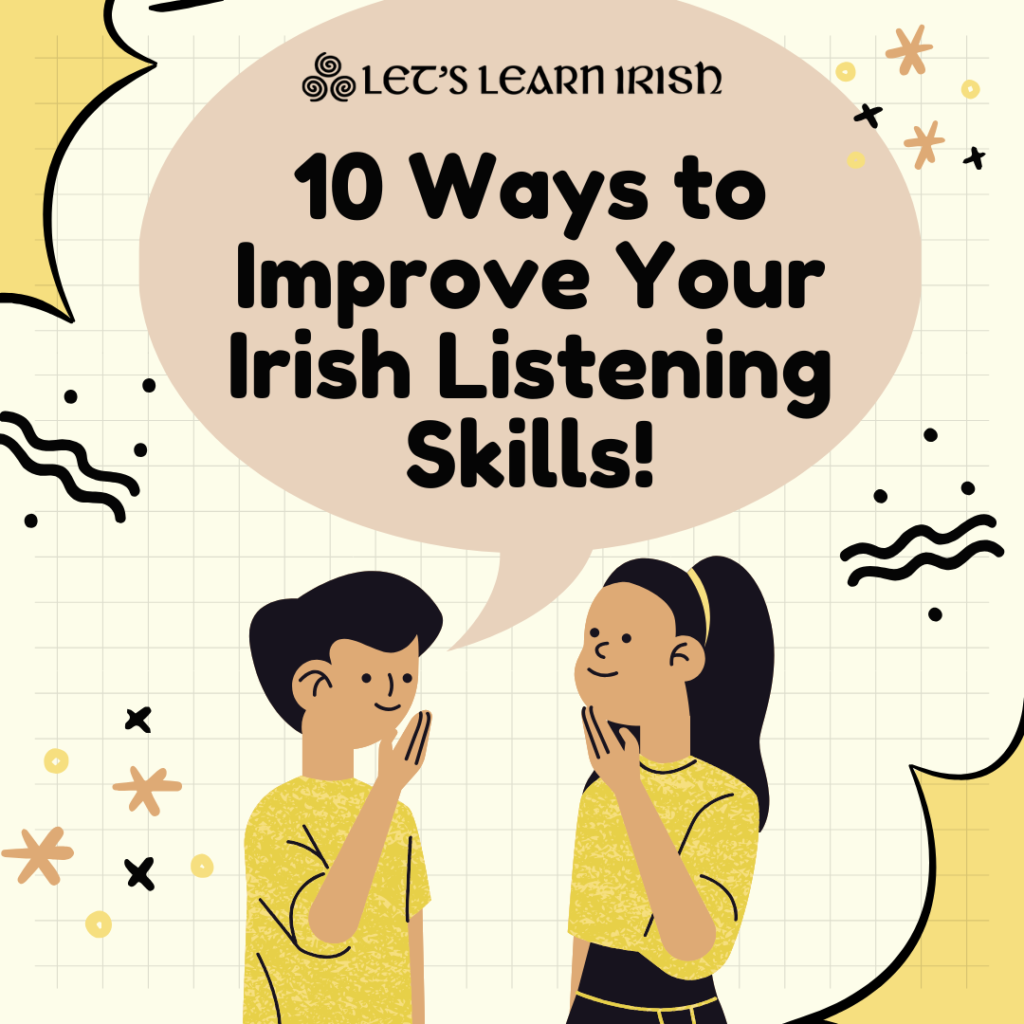How Dyslexia Helped Prepare Me for Learning Irish

Dia dhaoibh arís a chairde, táim ar ais – Hello again my friends, I’m back! By now you’ve likely read about how I got started learning learning Irish in London, and some of the joys and obstacles faced along the way. Today, however, I want to talk about something that I think has been integral to my journey learning Irish (and any language in general) and that is FAILURE.
Tá sé gránna, nach bhfuil? – Isn’t it ugly? It’s the kind of word that sticks in your teeth – you find yourself spending a lot of life trying to avoid it because to fail makes you a failure, or so some archaic schooling systems would have you believe.
Bhuel, níl aontaím leo ar chor ar bith agus inseoidh mé daoibh cén fath. Well, I don’t agree with them at all and let me tell you why!
 Fadó, fadó (long, long ago), I was a child growing up with dyslexia. If you haven’t experienced growing up with dyslexia it is a lot like feeling like you are a dog in a human body that is constantly distracted by everything, can’t understand what anyone is telling you and further, don’t necessarily want to understand because it looks boring anyway. This ends up causing some communication issues between yourself and every teacher you ever encounter. Some teachers, the ones I will unbiasedly deem the good ones, work to accommodate your different learning needs and keep you engaged. Others seem to quickly become exasperated that you cannot learn in the same one-size-fits-all approach and you become a piece of classroom scenery with a name and a penchant for misunderstanding everything. Due to this, I spent the majority of my academic life being told I was lazy, not trying hard enough or just plain stupid.
Fadó, fadó (long, long ago), I was a child growing up with dyslexia. If you haven’t experienced growing up with dyslexia it is a lot like feeling like you are a dog in a human body that is constantly distracted by everything, can’t understand what anyone is telling you and further, don’t necessarily want to understand because it looks boring anyway. This ends up causing some communication issues between yourself and every teacher you ever encounter. Some teachers, the ones I will unbiasedly deem the good ones, work to accommodate your different learning needs and keep you engaged. Others seem to quickly become exasperated that you cannot learn in the same one-size-fits-all approach and you become a piece of classroom scenery with a name and a penchant for misunderstanding everything. Due to this, I spent the majority of my academic life being told I was lazy, not trying hard enough or just plain stupid.
Surprisingly, this did not do wonders for my self-esteem and I dropped out of school at 16 with few qualifications to my name, spending the next few years working in factories, industrial sites, removal companies and kitchens. While my friends were all going off to university, I didn’t have the grades to be accepted anywhere (I told myself that I was thankful to not be going into the copious amounts of debt a student loan entails in the UK – a fact I have now conveniently chose to ignore given that I currently am one myself).
 Working in kitchens, I found I excelled quickly. I had gained a thick skin from all those years of failure and was able to take the high stress kitchen environment in my stride, to take a knock and keep going anyway. I began to realise that my previous failure did not have to define me – and that when you are at the bottom, the only way is up.
Working in kitchens, I found I excelled quickly. I had gained a thick skin from all those years of failure and was able to take the high stress kitchen environment in my stride, to take a knock and keep going anyway. I began to realise that my previous failure did not have to define me – and that when you are at the bottom, the only way is up.
Bhí an ocras an domhain orm – I had the hunger of the world on me: the hunger to be seen as something more than I had spent my whole life being defined as. It started to become clear to me that while I had a weakness (failing at everything in school), I could turn that into a strength by acknowledging it, by not letting my failures affect me negatively and continuing regardless. After all, once you have failed a thousand times over, what difference is a few more?
Starting to learn Irish at around 22 was the first time in my life I had tried to learn a language in earnest. I had studied French in school for a year and a half, during which time I remembered only piscine and the time Connor threw a chair at the teacher. It would be fair to say it wasn’t the best learning environment, as being in the bottom set (our catholic school grouped sets by ability; I was in the lowest for all but English) meant that 90% of every class was focused on the teacher shouting at the students to stay in their seats. I probably learnt the most French words from the displays on the walls of the classroom.
Learning Irish felt very different to that as I knew I had an intense internal motivation to learn it for myself. I had thought to myself ‘when I eventually do’, not ‘if’, and I felt that allowed me a certain calmness in my approach to learning. It did not matter how many years it took, I would learn it, and I would learn it well. Having my first evening classes in Limerick I remember looking around me and thinking I clearly wasn’t the only one who had such an experience in school. People who had been learning it their whole lives were nervous to offer potential answers, fearful of the shame of an incorrect response. This is where I began to realise the strength hidden in all my schooling failures – I was able to try, and try again. It didn’t matter if I got it wrong because then I would learn it better. I began to improve quite quickly simply due to my continual failings, occasionally enjoying the delirious ecstasy of a correct answer.

It made me realise that those experiences of academic failure gave me one of the most important aspects of learning a language (nó gach rud eile freisin – or anything else either) – the power to carry on despite meeting failures, the power to not be defined by them.
I think, in a way, learning a language is an act of continual failing; you make mistakes, learn from them, and make more ones until you make less. Having been a language teacher myself for three years previously, I realise that it isn’t the mistakes that are bad, but the view that they shouldn’t be there. Failure and mistakes are organic, not walls that declare imigh leat – off with you, instead they are the steps themselves that we must forge to make our way. As Marcus Aurelius says, ‘what stands in the way, becomes in the way’.
I had previously pigeon-holed myself as someone who just ‘couldn’t’ learn languages. Saying I was dyslexic made this easier, a nice silky blanket of self-assured excuses to avoid ever taking responsibility for them. Despite this, I greatly admired people who could speak languages while bemoaning my own personal tragedy, the fact I was born naturally inferior and would never, ever be able to learn, ochóin ‘is ochóin – woe, o’ woe!
Something that truly changed that thought for me was one of my students from when I used to teach English in Italy. He was an old man who had dropped out of school early to run the family’s small provincial shop all his life. A few years previously, having had no children or wife and deciding he wanted something to do with his evenings, he signed up for English classes. Despite having no academic background, experience with English, or even need, he had acquired a really good level of English simply because he had been there and he tried. That made me realise that sometimes life is just about turning up.
I now have the mind-frame that someone can learn anything, do anything, be anything, as long as they are stubborn enough to persist and brave enough to continually fail. I admired people who spoke another language so much that I decided to become one, and I believe anyone can. It simply starts with having the bravery to say to yourself ‘I can’. So fail hard, fail soft, fail in the evening, noon and night – fail until you fall over – just get back up again, and keep going.
Tá an domhan ar fáil – the world is to be taken.
Join the online Irish community for cúrsaí, comhrá & ceardlanna, and follow along on social media @LetsLearnIrish – beidh fáilte romhat!






Bart – Good for you!!! I am 59, and learning Irish in America, and I too am dyslexic. I have yet to run across another person whose dyslexic and learning Irish, but I always wanted to ask about if their experience is similar to mine. I actually find it easier than English, anyone looking at modern Irish typescript has to believe that it must have been written by a dyslexic. (Not joking either or trying to be racist, I am too am of 90% Irish catholic background. ) Do you find it easier or more difficult?